#Mi'kmaw
Text
i'm not really good at posts but i'd like to leave this in memory of Mi'kmaw elder and author Daniel Paul who passed away last month.
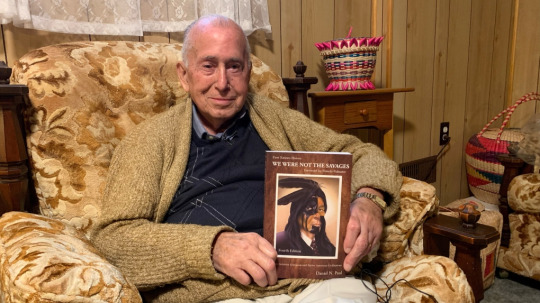
his book We Were Not the Savages is an incredibly detailed, researched, and impactful book on Mi'kmaq history, pre- and post-european contact and to the present day, including his personal experiences at the Schubenacadie Indian day school. i really don't have the words to express how important he and this book have been but it's really something to check out.
#and i'm a bit late first thought in my mind upon learning he'd died that morning was not exactly tumblr#we were not the savages#daniel paul#mi'kmaw#mi'kmaq#d:#indigenous#ndn#ndn tumblr#indigenous history
605 notes
·
View notes
Text
Apple users can now text their friends with a keyboard tailored for Mi'kmaw dialects and one fluent speaker thinks that will help the next generation of language learners.
The Mi'kmaw language keyboard, which rolled out last month as part of Apple software updates, was a partnership between Apple and Mi'kmaw Kina'matnewey, a language education authority for 12 communities in Nova Scotia.
Full article
Tagging: @politicsofcanada
#cdnpoli#canada#canadian politics#canadian news#canadian#Mi'kmaw#Mi'kmaw language#languages#Indigenous#First Nations#apple
258 notes
·
View notes
Link
When small claims court adjudicator Tuma Young wrote a decision over a dog custody issue recently, he wrote it in Mi'kmaw.
He said neither the courts nor the province of Nova Scotia prompted his action but rather he said it was time.
"To bring our L'nu [Indigenous] laws means we bring our language to the courts," said Young, who is from Eskasoni First Nation.
Young is a lawyer and for the past four years he has been delivering decisions as an adjudicator. He's written most of them in English but Nova Scotia named Mi'kmaw its "first language" last year.
Young said the Mi'kmaw language holds his nation's legal framework and it shows how people should govern themselves. He said by writing his decision in Mi'kmaw, he said it's "a big step forward for the Canadian legal system."
Neither of the people in the dispute were Indigenous, but by issuing his November ruling in the language he said he hopes to show that Mi'kmaw law can help resolve non-Indigenous disputes, too.
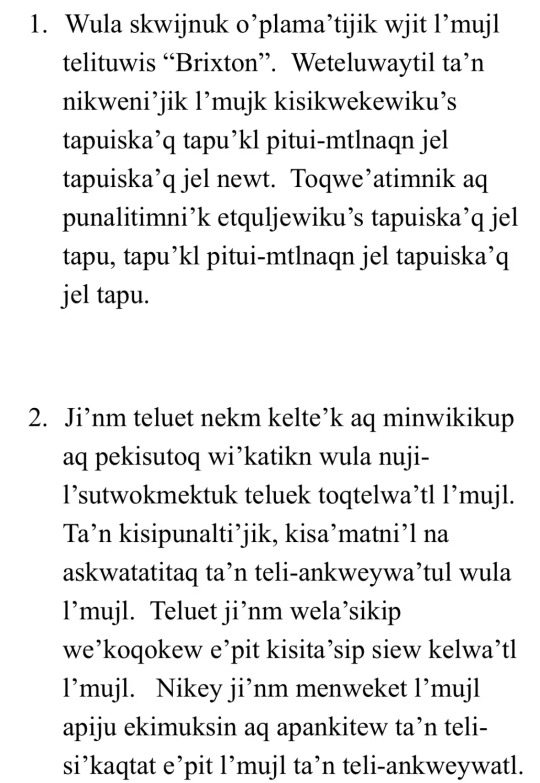
Trina Roache, a journalism professor at the University of King's College in Halifax, said Young writing his decision in Mi'kmaw was brilliant because it puts the language at centre stage.
"Understanding how important it is and the challenge it is to introduce Mi'kmaw perspectives into a colonial institution is an incredible step," said Roache, a member of Glooscap First Nation.
She said having a decision written in Mi'kmaw in the courts may encourage non-Indigenous people to learn more about the language and by extension the people, too.
Trevor Bernard, a Mi'kmaw lawyer, said he was amazed to see a court document written in Mi'kmaw and he hopes it inspires Mi'kmaw youth to see themselves in any institution.
"Growing up in a non-Indigenous school system, you kind of have this belief instilled in you that the Mi'kmaw language wasn't very important," said Bernard.
"I hope decisions like this will show people that language is important and there's room for it."
69 notes
·
View notes
Text
i finally found the thing i've been looking for
searching for, for years
i finally found it on an island out east
and there it tasted just as i'd imagined it would
rich chocolate, delicious and sweet
where i couldn't smell the difference in the air
but i could feel it on my skin
where i found myself in that rich red dirt
where it fades to soft amber sand
where it fades to an endless horizon of steely blue
and when i found it again here
at home, in the gray world
of tall glass buildings and honking cars
and the gasoline i can smell
it doesn't quite taste the same here, no
synthetic sugar, not quite right
not like it did on that island out east
with the rolling hills and the deep green trees
and the goats and the cows and the potato fields
ah, that's home, that's where i'm from
if not me then my family
and my family's family
l'nuk, on the mi'kma'ki
prince edward island/epekwitk by laika wallace
#prince edward island#pei#epekwitk#native poetry#indigenous#indigenous poetry#native#native canadian#native american#mi'kmaq#mi'kmaw#l'nuk
8 notes
·
View notes
Text

8 notes
·
View notes
Link
Mi’kmaw poet and storyteller shalan joudry says she was inspired to write her play, KOQM, when she noticed the town of Annapolis Royal’s plans in 2021 to celebrate 400 years of the signing of the 1621 Charter of New Scotland (Nova Scotia).
“Annapolis Royal is celebrated as a European colonial town and I understand that they want to celebrate,” joudry, a member of the Bear River First Nation, explained.
“At the same time, I am constantly wondering what it was like for our ancestors in this region through all of those colonial times,” she said.
88 notes
·
View notes
Text
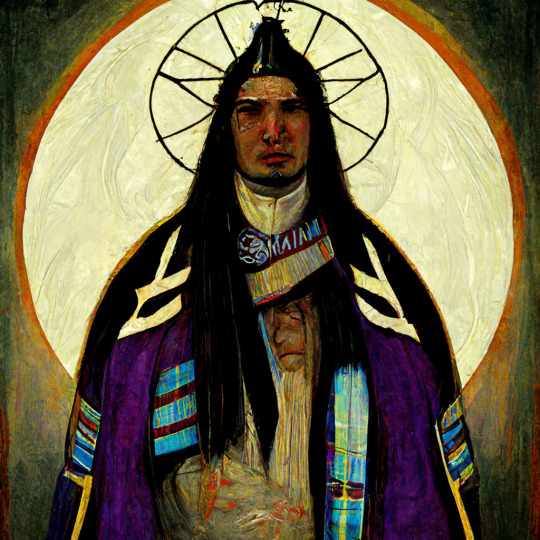

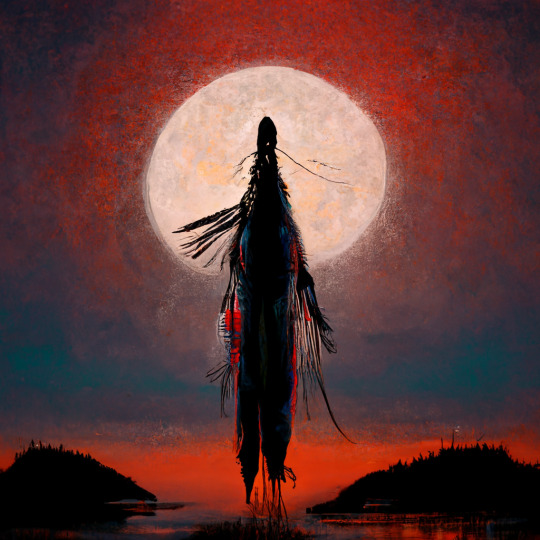
Commission of a Cybersaint-styled Mi'kmaq (top), as well as the Mi'kmaq folk hero Glooscap (bottom, left) and his brother Malsumis (bottom, right).
Commissioned by @admiralexclipse on twitter.
#mikmaq#mi'kmaq#glooscap#malsumis#mi'kmaw#ai art#portraits#portrait#folklore#ai artwork#reachartwork#commission#commissions#indigenous
62 notes
·
View notes
Text
#hip hop#rap#rap music#rapper#underground hip hop#underground rap#canadian hip hop#canadian rapper#indigenous#mi'kmaq#indigineous people#mi'kmaw#underground#r and b#country rap#gangsta rap#hip hop music#east coast rap#east coast#wild west#nativeamericans#new music#native american#nova scotia#ontario#artists on tumblr#song#pop music#musician#music
2 notes
·
View notes
Text
Day of Commemoration for the Acadian Expulsion
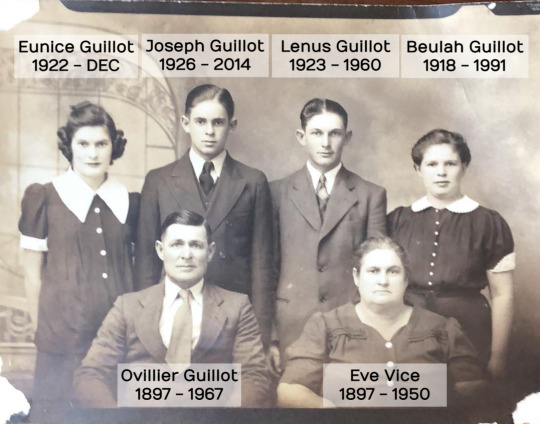
Image Description: A black and white portrait of the Ovillier Guillot and Eve Vice family, circa the early-to-mid 1900s. Top (children), left to right: Eunice Guillot 1922-Dec; Joseph Guillot 1926-2014; Lenus Guillot 1923-1960; Beulah Guillot 1918-1991. Bottom (parents), left to right: Ovillier Guillot 1897-1967; Eve Vice 1897-1950.
The two daughters wear similar dark, button-down dresses with white doll collars. The mother wears a dark, button-down open-collar blouse or dress. The two sons and the father wear white dress shirts covered by fastened suit jackets complete with ties.
Image by [[TBD]].
— — — — — — — — —
Pictured above is my 3rd great-uncle Ovillier Guillot and his family. He is the 4th great-grandson of Jean Baptiste Guillot.
Today is the Day of Commemoration for the Acadian Expulsion.
While I have quite a few direct ancestors who lived in Nova Scotia and ended up in France at the time of the expulsion, there's only one family unit that I have been able to confirm was expelled.
That was the family of my 8th great-grandfather Jean Baptiste Guillot, born in Acadia in 1720 with his body given to the Atlantic Ocean in 1758. His family was expelled from Cobequid, Acadia, Nova Scotia to France during the brutal "Great Expulsion" by the British, who wanted to squelch any potential threats from the Acadians and the Mi'kmaq during the French and Indian War.
His son (my 7th great-grandfather) Charles Olivier Miquel Guillot was only 13 in 1758 when they had to take the long, arduous 75-day journey to France. His father Jean, along with 4 of his brothers, never made it off of the ship.
Charles grew up in France where he married and had 3 children of his own. They left France in 1785 to board one of the seven ships paid for by Spain, Le Saint-Rémi, to take them to Lafourche Parish, Louisiana.
Many members of the Wabanaki Confederacy (I believe predominately it was the Mi'kmaq militia), in addition to other affiliated Indigenous tribes and Acadians, who rallied a resistance were slaughtered or expelled. They refused to swear loyalty to the British crown and surrender to British colonists, refused to convert from Catholicism to Protestantism, and refused to allow themselves to be displaced without a fight. Numerous battles took place to stop the deportation with wins and losses across the board.
While no one has one lineage, I was raised as a proud Cajun despite having often felt ashamed of being Cajun for various reasons (like my accent). I even tried my hardest over twelve years to banish anything that could link me to my roots, not knowing the history behind a part of my ethnicity and culture.
Digging into my ancestry has been a wild ride, and there were many things found within my lineages that were not honorable in any way, but this chunk of my history? This has made me proud to be Cajun again.
I wish I had respected it more when I was still able to be immersed in it. I wish I had asked my pawpaw to tell me more stories. I wish I had kept up with Cajun French (AKA Louisiana French). I wish I hadn't let my cultural heritage fall through my fingers.
Many blessings to those who fought and lost their lives against the British colonists in an attempt to secure the freedom of not only themselves but of future generations to come.
[Disclaimer: I am still only beginning to educate myself about this event and am utilizing my current understanding of how events unfolded and who was involved. I apologize in advance for any misconceptions or misinformation regarding the historical accuracy of my comments.]
#Nova Scotia#France#Canada#Acadia#Acadian#Acadian Expulsion#Day of Commemoration#History#Family History#Family#Genealogy#Genealogy Blog#Twisting Tree#Twisting Tree Ancestry#Ancestry#Ancestry Blog#Cajun#Le Saint Remi#Day of Commemoration for the Acadian Expulsion#Guillot#Guillot Family#Louisiana#Louisiane#Acadie à la Louisiane#Acadie#Mi'kmaq#Mi'kmaw#French and Indian War#Pawpaw#Cajun French
6 notes
·
View notes
Photo
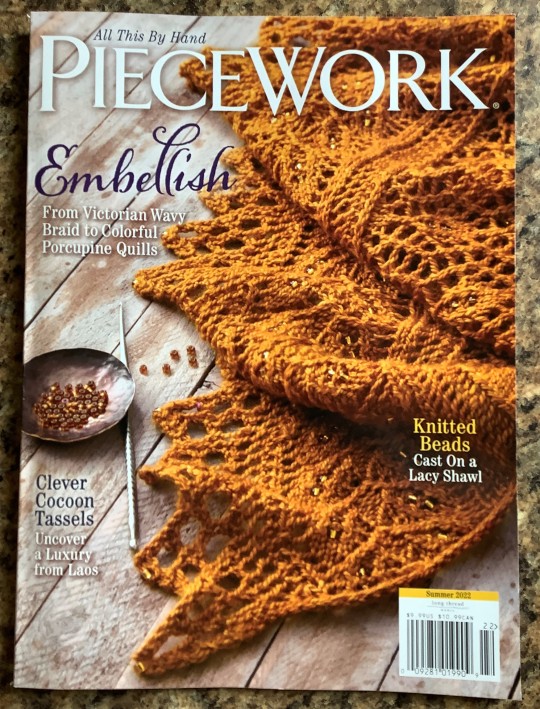



Piecework, Summer 2022
This issue has a lot of history about needlework and a few projects as well. You see on the cover a knitted, beaded shawl that is a reworking of a 19th Century shawl. Called Leaves and More Leaves Beaded Shawl by Carolyn Wyborny, it forms a large triangle with the beads added using the crochet hook method. This means drawing a knit stitch through the hook and then continuing to knit versus the stringing method in which you have to string ALL the beads onto your yarn and include them as you go. The lace patterns are charted.
The 2nd project you see pictured here takes one of the humblest of modern trims: rick-rack. It was dubbed wavy braid in the 19th Century and used for trim or even entire children’s dresses. Katrina King shows you how you can use crochet thread to do this.
Then you see a close-up of a leaf created via Italian shading, a very old technique for couching, i.e. sewing down, metallic threads, which is still used for very ornate embellishment today as Natalie Dupuis explains. The last picture uses a material very few of us will ever see: porcupine quills. The Mi’kmaw people of North America dyed them and used them as embellishments according to Annamarie Hatcher. There are also articles on bodkins, a tool for pulling through threads or ribbons, on organic embroidery, on lappet weaving, and more.
Find it at your local bookstore, or online here: https://pieceworkmagazine.com/
#mi'kmaw#porcupine quills#annamarie hatcher#natalie dupuis#italian shading#couching#rick-rack#wavy braid#piecework#piecework magazine#needlecraft#vintage needlework#vintage needlecraft#needlework#knitting#vintage knitting#vintage knitting patterns#carolyn wyborny#leaves and more leaves#leaves and more leave beaded shawl
8 notes
·
View notes
Text
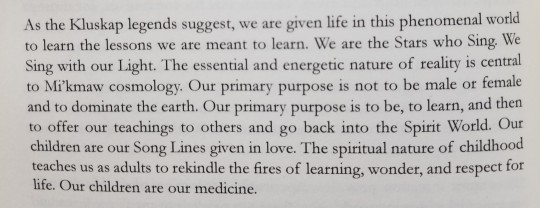
As the Kluskap legends suggest, we are given life in this phenomenal world to learn the lessons we are meant to learn. We are the Stars who Sing. We Sing with our Light. The essential and energetic nature of reality is central to Mi'kmaw cosmology. Our primary purpose is not to be male or female and to dominate the earth. Our primary purpose is to be, to learn, and then to offer our teachings to others and go back into the Spirit World. Our children are our Song Lines given in love. The spiritual nature of childhood teaches us as adults to rekindle the fires of learning, wonder, and respect for life. Our children are our medicine.
Mi'kmaq Puoinaq Two Spirit Medicine: Sexuality and Gender Variance, Spirituality and Culture by Dr. Joseph Randolph Bowers
0 notes
Text
Halifax councillors will look at creating a designated Mi'kmaw council seat, and reviving the idea of allowing permanent residents to vote in municipal elections.
A report on what changes would be needed to bring in various electoral reforms came before the city's executive standing committee on Monday. It noted the municipality does not have the power on its own to establish designated districts for specific groups, like African Nova Scotian, Acadian, or Indigenous representation, without permission from the provincial government.
Coun. Waye Mason of Halifax South Downtown said the timing is right, because a common theme emerged from Mi'kmaw groups during consultation on Halifax's new culture and heritage priorities plan.
"What we heard, over and over again, was 'we think there should be a Mi'kmaw seat in Halifax,'" Mason said during the meeting.
Continue Reading.
Tagging: @politicsofcanada
85 notes
·
View notes
Link
On a warm, clear day in February, Brenda Germain picks up a large hand drill and asks her students to gather around.
Drill in hand, she shows the children how to cut through the thick ice covering Chaleur Bay, on Quebec's Gaspé coast.
"Pase'g mgumi — the ice is this thick," her colleague and aunt, Joyce Germain, tells the students as they kneel over the hole, hoping to catch some smelt, or kaqpesaw.
The class outing is being held entirely in Mi'kmaw — a language that Brenda Germain says she "didn't speak a word" of, just a decade earlier.
"I spent 35 years of my life thinking, 'ah man, I missed the boat,'" she said.
But her life — and her teaching career — took a sharp turn in 2018, when she switched roles in the classroom. Brenda Germain enrolled as a student in the Mi'kmaw adult immersion program, offered by the Elawsimgewei Gina'muo'guom Adult Education Centre in Listuguj, Que.
In addition to the classes, "just from coming out on the land with [Miss] Joyce every day has taught me" the language, she said.
"It's super important to tell people: no matter what age you are, you can start somewhere."
11 notes
·
View notes
Text
First Peoples Shared Stories: orders open now!
Laika Wallace’s short story, Snow Blindness, has been published in First Peoples Shared Stories by Flame Tree Publishing!
Taken from the publisher’s website: Following the success of Black Sci-Fi Short Stories comes a powerful new addition to the Flame Tree short story collections: the first peoples in Africa, Asia, Oceania and the Americas, the first migration, the first exploration, the discovery of land and landscape without the footprint of humankind. Stories of injustice sit with memories of hope and wonder, dreamtime tales of creation and joy highlight the enduring spirit of humanity. These stories, selected from submissions by new writers and cast alongside ancient stories and oral traditions from around the world bring new perspectives to the legacy of First Nations, of First Peoples.
His addition to the anthology follows a Mi’kmaw trans lesbian and hir daughter searching for a planet for their family to call home after being adrift in space for many generations, and finding something they could never have predicted, for better or for worse…
Orders are open now at the link in the first reblog. Reblogs are very appreciated, as are requests for the book at bookstores and libraries. Thank you for supporting indigenous authors!
#indigenous authors#indigenous fiction#indigenous fantasy#indigenous scifi#support native authors#support indigenous authors#support small authors#flame tree publishing#first peoples shared stories#lesbian characters#trans characters#trans authors#support lgbt authors#two spirit#two spirit authors#mi'kmaw#mi'kmaq#outer space#snow blindness
28 notes
·
View notes
Link
0 notes
Text
youtube
A Mi’kmaw fisher who has fought for fishing rights for over 20 years decided to become a commercial fisher and follow Department of Fisheries and Oceans regulations – but that hasn’t prevented his traps from disappearing or his boat from being damaged.
2 notes
·
View notes